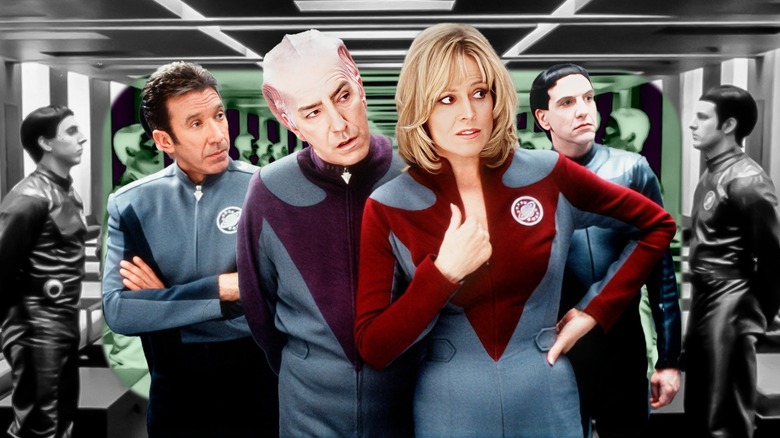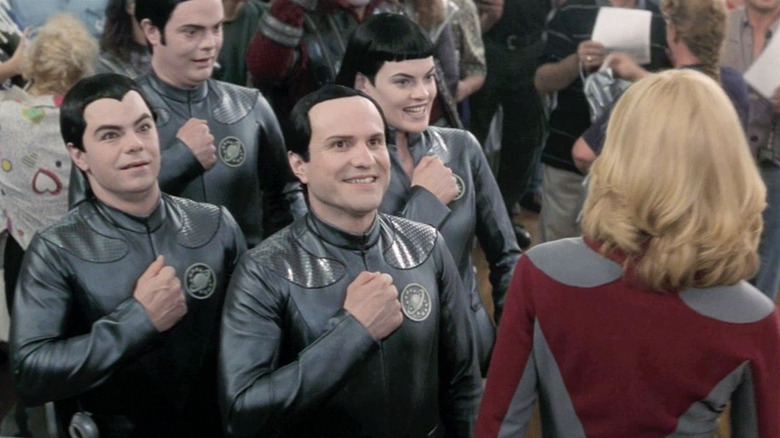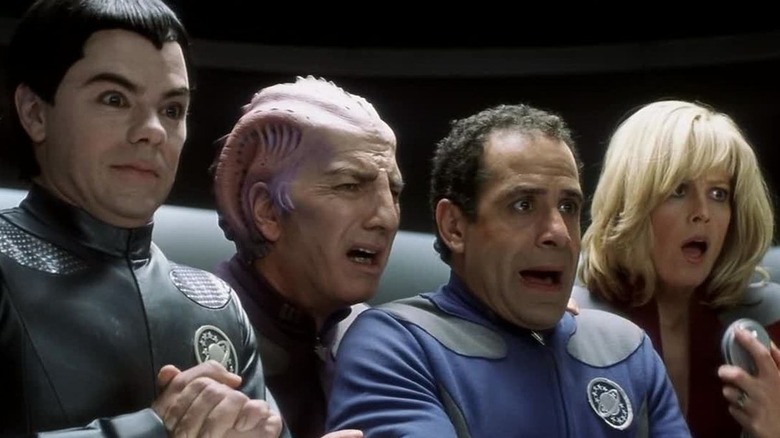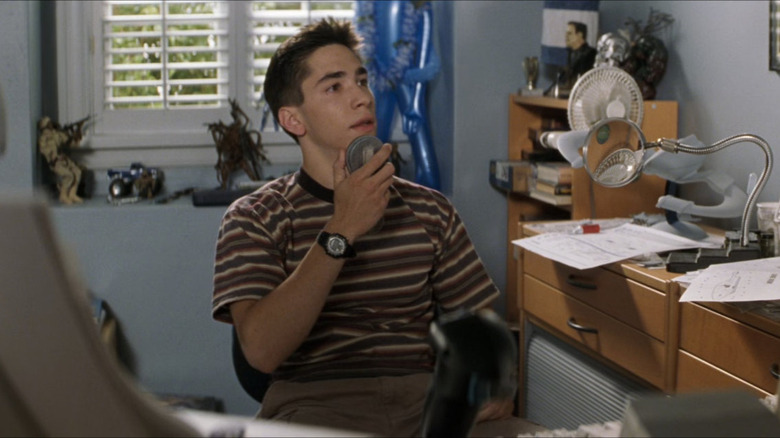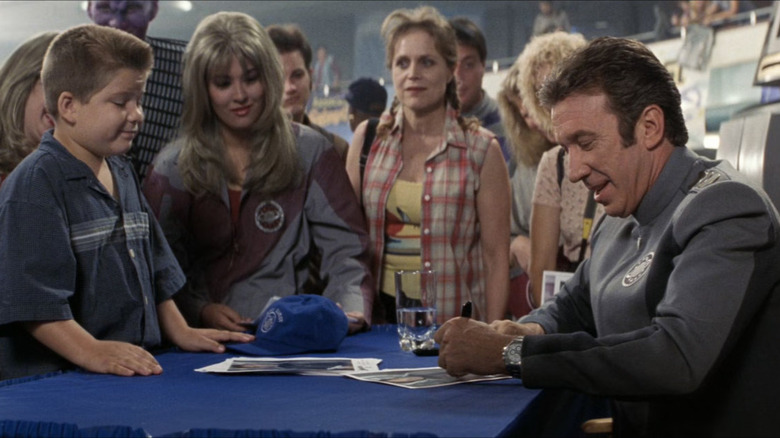Galaxy Quest's Message About Fandom Has Only Grown Stronger – And We Need To Pay Attention
Fandom is an intense thing. People dedicate themselves to a thing because they love it, and in return, there's a sense of belonging to something bigger. Some people align themselves with a sports team, some unite because of their love for a film or television franchise, and others become the champions of comic books. Regardless of what fandom you look at, there are bound to be superfans, people who have taken that love a step further and made it a massive part of their lives. Fandom is a double-edged sword, and sometimes people can get so wrapped up in their obsession that it can truly be their downfall.
The 1999 science fiction comedy film "Galaxy Quest" was already a beautifully biting look at how much media literacy really matters and the potential pitfalls of fandom in its time, but in 2023, it's become even more relevant than ever. The film not-so-secretly spoofs "Star Trek" and its fans, taking the stars of the fictional "Galaxy Quest" television series on an adventure when aliens who thought their show was real end up recruiting them for intergalactic war. While it's not likely that Anson Mount or Ethan Peck is going to get kidnapped by Martians and asked to save the planet anytime soon, the way these outsiders take the series at face value is a very important warning for all of us, and a reminder of the true power of fiction.
Fandom can be intense
"Galaxy Quest" follows the former stars of a fictional 1980s television series called — you guessed it — "Galaxy Quest," as they reconcile with the fact that their careers as television stars are now in the years of conventions and promotional appearances and the best is behind them. Series star Jason Nesmith (Tim Allen), who played the heroic Commander Taggart, is clearly frustrated with the state of things and he takes it out on both his co-stars and his fans, lashing out at superfan Brandon (Justin Long in his very first film). Nesmith's co-stars are significantly kinder to their fans and one another, even when they're understandably exhausted by going through the motions over and over again.
Alexander Dane (Alan Rickman), who played the alien Dr. Lazarus doesn't berate the fans who say his catchphrase to him on repeat, instead replying back to them (albeit unenthusiastically). Like Leonard Nimoy replying to a Spock fan with his millionth "live long and prosper," Dane at least understands the importance of the words "by Grabthar's hammer" to the fans, even if it means nothing to him.
A lesser film might have made the fans purely punchlines, but "Galaxy Quest" is careful to highlight the humanity in these devoted dorks. Even the most annoying fans are clearly there because they're passionate and they love the show, while the actors' resentment is fairly understandable. It's a tricky situation that's only made more challenging when a group of actual space travelers arrive and kidnap Nesmith because they think he's actually Commander Taggart.
Absolute devotion to a lie
The otherworldly Thermians faithfully re-created the ship from the TV series down to the finest detail, and eventually end up recruiting the entire cast in their efforts to defeat the evil Sarris (Robin Sachs), an alien warlord who has destroyed the Thermian home world and seeks to exterminate the final survivors. It's all fun and games until the actors realize the very real danger they're in. It's not until they're boarded by Sarris and he has them completely cornered that Nesmith finally reveals that they're only actors and the show was not "historical documents" but a work of fiction.
Fans on our planet never take their love for a franchise quite as far as the Thermians, but that's because they were made aware of the falsehood from the start. The Thermians never questioned anything, taking the transmissions of the show they found as fact. They then built their entire hope for their people around what turned out to be a total lie.
Their blind devotion almost ends up being their downfall, and their lack of understanding of truth is pretty comparable to some people in our world who completely lack media literacy. Some individuals don't understand that even things that are alleged "news" can be falsehoods and that all forms of media have some kind of bias. Like the Thermians, they are steadfast yes-men (and women and non-binary people) who simply follow along without asking questions, and that's prone to end in tragedy.
A little doubt is a good thing
The earnest hyper-fixation of the Thermians on "Galaxy Quest" is sort of endearing, but it nearly causes the extermination of their entire species. If just one of them had questioned the veracity of the "historical documents" they were watching, they might have been able to forge a way forward with less death and destruction. Their innocence is sweet, but the hardcore fanaticism of their real-life counterparts is rarely so gentle. Sometimes fans get together for a common cause and create fan campaigns that can have pretty powerful consequences. The worst of these campaigns are based on harassment, as toxic, entitled fans attack the creatives behind various projects, especially the more visible and vulnerable ones, like actors from marginalized communities. (Seriously, some "Star Wars" fans think they're Din Djarin when they're really Kylo Ren, but I digress.)
Fan campaigns can also have financial and creative repercussions, like the now-infamous social media campaign behind the "Snyder Cut" of "Justice League." While audiences should be able to sway studios via ticket sales because this is capitalism, baby, having the ability to throw tantrums and actually effect change is too much power and responsibility. Sometimes fans should take a breather and recognize that while they might not like a decision in a particular franchise, it's not really up to them. It's up to the writers, directors, editors, and everyone else that put hard work into creating that piece of media. Complaining is one thing, but negative campaigns and trolling are desperately childish.
Healthy fandom can be beautiful
Because "Galaxy Quest" is thankfully nuanced, the positives of fandom are also shown through Long's character, Brandon. He's a devoted fan of the series who knows that it's fiction, enough so that it really hurts his feelings when Nesmith blows up at him and yells about it "just" being a TV show. In the end, the crew ends up needing Brandon's help in order to survive a ridiculous series of traps onboard the ship created faithfully from an episode of the series. While that kind of thing isn't likely to happen in real life, the creators of some shows have wisely utilized their fanbase to help keep track of their canon. The writers on "Futurama," for example, would check fan wikis for reference because they were the most readily accessible source of basic and deep-cut information.
Fans also sometimes go on to be a part of the franchises they always loved, and the passion they bring to the project is almost always pure joy. Fans who end up working on their favorite franchise projects can help contribute, too, like Simon Pegg and Karl Urban on the "Star Trek" Kelvin-verse films or Tawny Newsome's love for "Star Trek: Deep Space Nine" causing a rewrite on her series, "Star Trek: Lower Decks." That's not quite the same as getting to help your heroes actually fly into outer space, but it's still a dream come true.
Art mirrors life mirrors art
One of the more surreal elements of the film's legacy is the connection between Nesmith and William Shatner, who played Captain James T. Kirk on "Star Trek." Rumors have circled for years that the actor could be rude to both fans and co-stars, and Nesmith is a pretty direct riff on those rumors. The film's creators had a difficult task in balancing satire with a genuine love for the things they were roasting, and Nesmith's arc was probably the most challenging. In the end, the disgruntled actor ends up having a total change in perspective after he goes into space for the first time, and he ends up seeing the power of fandom when Brandon saves their butts in the end. There's no way that the writers could have anticipated the same thing would actually happen to Shatner, but it did.
In 2021, the actor went up into space as a part of a civilian trip with billionaire Jeff Bezos, and what he saw changed him. He wrote about his experiences for /Film, where he said:
"We live in an age when so many things are pulling us apart. Our politics, our media, and our technology are all optimized to exploit our differences. But when you look down from 300,000 feet, all that falls away. What remains is an appreciation of the word "humankind", and fierce desire to work towards a future defined by things that bring us together instead of those that tear us apart."
He also talks about how fans will lead the way into the future, and it's a whole lot like Nesmith's change of heart. Fandom is an incredible power that can be used for good or ill, and "Galaxy Quest" is an important reminder about wielding that power responsibly.
